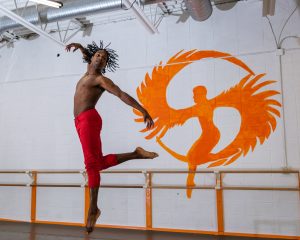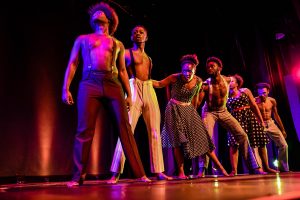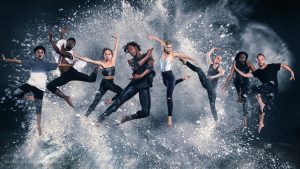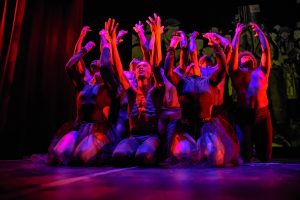
Justin Sears-Watson. Courtesy of Benji Gerlitz. Used with permission
In the aftermath of George Floyd’s brutal murder and subsequent protests, the entire world is focused on ending systemic racism, not only in law enforcement, but also in other sectors and institutions, including the performing arts. With that in mind, I sought out dancer-choreographer Justin David Sears-Watson for his perspective on how racism has impacted him as an artist who happens to be person of color. A former Dance Kaleidoscope company member, Sears-Watson is a co-founder, with husband Will Sears-Watson, and artistic director of Phoenix Rising Dance Company, a resident company of Phoenix Cultural Centre. They also own and operate Phoenix Rising Dance Studios. In addition, Justin David Sears-Watson is an adjunct faculty member of Indiana University Department of Theatre, Drama and Contemporary Dance.
Sears-Watson has enjoyed a distinguished career that includes training with companies in Chicago and under Alexei Kremvnev and Anna Reznik, Cincinnati Ballet Academy and Giordano Dance Scholarship Program. Working with renowned choreographers from around the globe, he also danced with Giordano Jazz Dance, Thodos Dance, and Inaside Dance, all in Chicago, and Liz Shea at IU.
Reaching out to Sears-Watson by phone, the first obvious question was if racism exists in the dance world and how it has impacted him personally. “If racism didn’t exist in the dance world, then it wouldn’t be absolutely necessary for companies to exist which are marketed, shaped and strongly defined by the fact they are a dance companies primarily composed of say, ‘black,’ ‘Hispanic,’ ‘Asian’ dancers and so on. These companies exist, and thank God, so that dancers of color have options in the dance world.” Sears-Watson added, “Most dance companies are primarily made up of white dancers with splashes of color mixed in and about. This may sound harsh or may be hard for people to hear, but it’s the truth. As well, when we see dancers of color, primarily black dancers, we want to attribute all of these biases and characteristics to the dancer, and at times, if they don’t give us exactly what we have created in our minds, then we’re disappointed.”

Phoenix Rising Dance Company. Courtesy of JustFam Photography. Used with permission.
Offering examples of how he has been treated, Sears-Watson said, “There has been type-casting. I have been denied roles based on the color of my skin. Jokes being made about the color of my skin, food jokes, beverage jokes. Getting certain roles and denied others. The list goes on and on. One that sticks out in my mind is being in a hoodie and being told I look like Trayvon Martin. It exists everywhere in this country, but this is something that black people realize and it becomes a part of our everyday experience. So, instead of allowing it to hold us back, we are required to work twice as hard for the same amount of respect or success.”
Pointing out that many people see the George Floyd killing as a tipping point, I asked Sears-Watson for his thoughts. “I see the protests as necessary for change. They are cathartic. When there are enough people who want change and others who want to hold on to the old way of thinking, then there are going to be problems. It’s like a tug of war and the racists, or those who want to ignore what is happening, will either be silent and avoid, resist with all their might, or fight back. The protests have to happen because if they don’t, absolutely nothing will change,” insisted Sears-Watson. “Some people may believe black people are getting off on this, but the truth is, it’s heavy, overwhelming and it hurts, but to stay where we are, to continue to accept this police brutality, this inequality in so many areas of existence in this country, well that pain, hurt and discomfort are far worse.”
I asked what he hopes the Black Lives Matter movement will accomplish. “I hope it will open America’s eyes to what we have experienced from birth. That because there are so many white people in places of power, that it’s going to have to be a large amount of work for them to create the change. We can’t do it alone because if we could have, it would have been done by now. There are people in power who would rather see us fail or change the narrative. It’s going to have to take legislative change, executive change, in government, in corporations everywhere,” he said.
Sears-Watson stressed, “I am part of the Black Lives Matter movement and I’m going to do everything in my power within my business and my art to help educate, to help show people that diversity is what makes us better. Conformity and sameness do not aid creativity and innovation. Diversity and differences do and make us stronger. It’s a symbiotic and beautiful thing. It’s all around us in the world, in nature, in paintings. It’s right there for us to see that different is beautiful and create a profound oneness and unity, but only in the human race do we feel that it’s different.”

Phoenix Rising Dance Company. Courtesy of David VanDeman. Used with permission.
When I asked Sears-Watson about his interracial relationship with his husband Will who is white, and what it has taught him, he said, “It has helped me see where I can grow and shift. It has helped me see things from a privileged white man’s perspective. It has also made me stronger because the exchanging of ideas and working together in any relationship is important. My husband understands where my anger comes from. He understands why I do the things I do, but he also accepts my changes.”
“At the end of the day the color of our skin does make us different because our experiences on this earth are different, but our souls are not different,” Sears-Watson said. “We are all, in essence, made up of the same stuff. It’s sad that one thing, the color of our skin, is what has created so much hurt and pain in this nation and around the world from the beginning of time. My relationship with Will has taught me that, in truth, we all have the same fears, hopes, dreams and sadness at the end of the day. But why racism lives on is the fear of losing power and such embedded indoctrinated beliefs of being better, more deserving, higher up on the food chain. In truth, it’s just madness.”
Besides experiencing this unprecedented period of social unrest and self-examination, Sears-Watson, like the rest of us, is also coping with the parallel crisis of COVID-19 and its fallout. As a result of the lockdown, his company had to cancel numerous performances and programs. As far as his studio, he had to cancel classes when the stay-at-home order began. Both the company and the studio have sustained a substantial loss of income as a result. Currently, the studio is offering virtual classes.
As someone who is used to having a schedule that he described as “constant, go, go, go,” Sears-Watson has had to make some adjustments. “I’m spending a lot of time on me. The pandemic has helped me to get back to me and be intentional about who and what I want to be and create some time for me to do some soul-searching and be more honest with myself.” As far as the company and studio, he said the slowdown has given him time to think about how both are “affecting people’s lives” and how they can be “more instrumental in the community.” According to Sears-Watson, “The company’s mission is to transform the world through one dance at a time. The studio’s mission is to build confidence and character.”

Phoenix Rising Dance Company. Courtesy of JustFam Photography. Used with permission.
As far as any societal transformation that could result from the pandemic and the Black Lives Matters movement, he said, “I think what’s happening is a shift. I think people have stayed in the middle or have stayed silent. There was a separate mentality that ‘I am different from you’ and ‘You don’t matter.’ We have to come together and have conversations and work together. We can’t just run from it anymore. I hope this separating from each other and perhaps even taking each other for granted will not be the same. Being mean and bullying each other. All the bad things in the world. Maybe people will be kinder and more respectful of each other now.”
Using the human body as a metaphor, Sears-Watson went on to say, “I believe when we are sick in the mind with regret and misery, darkness, the dark side of the soul, that it tends to manifest itself in the body. We don’t look at the world as being one body. I think the world is reaching a point where it is sick and is trying to figure out how to heal itself.”
Concluding our conversation, I asked him if this moment in history has inspired him as an artist. “In every way,” he replied. “With space and silence comes a deeper understanding of yourself, a deeper understanding of what is needed. I have realized my experiences on this earth as a black man are what makes me strong, resilient, and that has to become more representative in my art. I think our last show ‘Nina Simone—The High Priestess of Soul’ was successful because of that, because I know that truth. It’s what speaks to me louder than anything else I’ve ever done. I am embracing everything about me now.”
Revealing he is very critical of himself, Sears-Watson admitted he has unrelenting standards “that can get in the way of my truth and stifle my authenticity. But the events of this year have allowed me to see the artist within me is not only the good things, but also the ‘bad.’ The imperfections are exactly what make me perfect. I am not talking about the color of my skin. That is definitely not an imperfection. But imagine growing up, believing the color of your skin is imperfect and because you are black, well, ‘Things are going to be just a little bit harder.’ Can you imagine the profound effect that can have on one’s psyche? So, yeah, all of that ugly, sadness, pain, hurt and yet, the hopefulness, joy, humor, the resilience is what makes me who I am. I am a phoenix rising, I always have been and always will be rising from the ashes, growing, changing, shifting every day. We all are. Every one of us.”
For information about Phoenix Rising Dance Company, visit phoenixdanceindy.org. To learn more about Phoenix Rising Dance Studios, go to phoenixdanceindy.com.
An excerpt from “Nina Simone—The High Priestess of Soul.” – Phoenix Rising Dance Company





